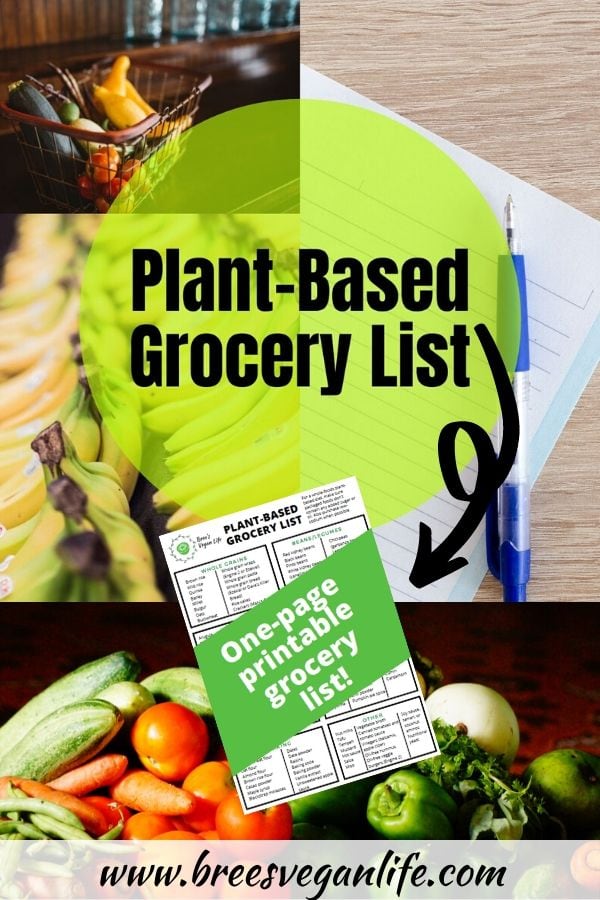```html
Your Ultimate Plant-Based Grocery List for Beginners: Thrive on Plants!
Embarking on a plant-based journey can feel overwhelming, especially when staring down the aisles of your local grocery store. Where do you even begin? This comprehensive guide provides aplant-based grocery list for beginners, making your transition smooth, delicious, and nutritionally complete.
Why Go Plant-Based? The Benefits are Abundant
More and more people are turning to plant-based diets for various reasons. Whether it's for ethical concerns, environmental sustainability, or improved health, the benefits are undeniable. A plant-based diet, rich in fruits, vegetables, whole grains, and legumes, can contribute to:
- Improved Heart Health: Lower cholesterol and blood pressure levels.
- Weight Management: Naturally lower in calories and higher in fiber.
- Reduced Risk of Type 2 Diabetes: Improved blood sugar control.
- Enhanced Digestion: Promotes a healthy gut microbiome.
- Increased Energy Levels: Sustained energy from nutrient-dense foods.
Building Your Beginner-Friendly Plant-Based Grocery List
Let's break down the essential categories to include in yourplant-based grocery list for beginners. Remember to choose organic options whenever possible to minimize exposure to pesticides.
Fruits:Nature's Sweet Treats
Stock up on a variety of fruits! They provide essential vitamins, minerals, and antioxidants.
- Berries: Blueberries, strawberries, raspberries, blackberries (fresh or frozen).
- Bananas: A great source of potassium and energy.
- Apples & Pears: High in fiber and versatile for snacks and cooking.
- Citrus Fruits: Oranges, grapefruits, lemons, limes (vitamin C boost!).
- Avocados: Healthy fats and a creamy texture.
Vegetables: The Foundation of a Plant-Based Diet
Load up on a rainbow of vegetables to ensure you're getting a wide range of nutrients.
- Leafy Greens: Spinach, kale, lettuce, arugula (essential for vitamins and minerals).
- Cruciferous Vegetables: Broccoli, cauliflower, Brussels sprouts (cancer-fighting compounds).
- Root Vegetables: Carrots, sweet potatoes, potatoes (filling and nutritious).
- Peppers: Bell peppers (various colors), chili peppers (add spice!).
- Onions & Garlic: Flavor enhancers with health benefits.
Grains: Fueling Your Body
Choose whole grains for sustained energy and fiber.
- Oats: A versatile breakfast option.
- Brown Rice: A staple grain for meals.
- Quinoa: A complete protein source.
- Whole Wheat Bread/Pasta: Opt for whole wheat over refined options.
- Barley: A hearty grain for soups and stews.
Legumes: Plant-Based Protein Powerhouses
Legumes are excellent sources of protein and fiber, essential for a balancedplant-based diet.
- Beans: Black beans, kidney beans, chickpeas, pinto beans (canned or dried).
- Lentils: Red lentils, green lentils, brown lentils (cook quickly and are very versatile).
- Peas: Green peas, split peas (good source of fiber and protein).
Nuts & Seeds: Healthy Fats and More
Nuts and seeds provide healthy fats, protein, and essential minerals. Opt for unsalted varieties.
- Almonds: A good source of vitamin E and magnesium.
- Walnuts: Rich in omega-3 fatty acids.
- Chia Seeds: High in fiber and omega-3s.
- Flax Seeds: Excellent source of lignans and omega-3s.
- Pumpkin Seeds: Rich in zinc and magnesium.
Plant-Based Dairy Alternatives: Creamy and Delicious
Several plant-based milk and yogurt options are available.
- Almond Milk: Low in calories and widely available.
- Soy Milk: A good source of protein.
- Oat Milk: Creamy and naturally sweet.
- Coconut Milk: Rich and decadent.
- Plant-Based Yogurt: Look for varieties with added calcium and vitamin D.
Oils & Fats: Essential for Cooking
Choose healthy oils and fats for cooking and dressing.
- Olive Oil: A heart-healthy option.
- Coconut Oil: Use in moderation.
- Avocado Oil: High smoke point for cooking.
Other Essentials for Your Plant-Based Pantry
- Herbs & Spices: Add flavor and health benefits to your meals.
- Nutritional Yeast: Adds a cheesy flavor to dishes and is a good source of vitamin B12.
- Tofu & Tempeh: Versatile protein sources.
- Seaweed: Provides iodine and other essential minerals.
- Vinegar: Balsamic, apple cider, and white vinegar for dressings and cooking.
Plant-Based Grocery List for Beginners: Sample Meal Ideas
Here are some meal ideas to get you started, based on yourplant-based grocery list:
- Breakfast: Oatmeal with berries and nuts, tofu scramble with vegetables.
- Lunch: Lentil soup, quinoa salad with roasted vegetables, avocado toast.
- Dinner: Black bean burgers, vegetable stir-fry with brown rice, chickpea pasta with marinara sauce.
- Snacks: Fruits, vegetables with hummus, nuts, seeds.
Frequently Asked Questions (FAQs)
What are the best sources of protein on a plant-based diet?
Excellent sources of plant-based protein include legumes (beans, lentils, peas), tofu, tempeh, quinoa, nuts, and seeds. Combining these sources throughout the day ensures you get all the essential amino acids.
Is it expensive to eat a plant-based diet?
It doesn't have to be! Legumes, grains, and seasonal vegetables are often very affordable. Buying in bulk and cooking at home can also save money compared to eating out or purchasing processed plant-based foods.
How do I ensure I'm getting all the necessary nutrients on a plant-based diet?
Plan your meals carefully to include a variety of fruits, vegetables, whole grains, legumes, nuts, and seeds. Consider supplementing with vitamin B12, as it's not naturally found in plant-based foods. Consulting with a registered dietitian can also help you create a personalized plan.
Ready to Embrace the Plant-Based Lifestyle?
Thisplant-based grocery list for beginners is your stepping stone to a healthier, more sustainable way of eating. Start small, experiment with new recipes, and enjoy the journey! Download our printable grocery list today and make your next trip to the store a plant-powered success!
```
